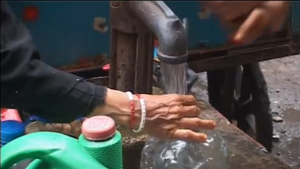
JULY 1 (Reuters) — Pakistan’s port city of Karachi is just a few kilometers away from the Arabian Sea, yet its citizens suffer from a chronic water shortage and a recent heat wave has made the situation worse.
Zubaida Bibi, a housewife from a poorer locality of Karachi, stood in queue near a water pump on Tuesday (June 30) waiting to fill her plastic bucket of water.
“The water problem was here before Ramadan. During Ramadan, the water problem is still here, and now that Eid is nearing, there is still not a drop of water. Tell me, how we are going to survive?” she said.
Daily wage laborer, Sarfaraz Ahmed, travels 10 minutes on his battered motorbike every day to get to the nearest water filtrations plant because there is no drinking water in the alley he lives on.
“I have this small child with me. We come on a bike and take four bottles of water. There is no water for drinking (in our locality). Tankers cannot enter the narrow alleys. And anyhow, a poor man cannot afford the Rupees 3000 to Rupees 4000 ($ 29.48 to $ 39.30) that they charge,” Ahmed said.
Almost all of Karachi’s water supply comes from two main sources — Keenjhar Lake and Hub Dam – both of which rely entirely on rain water.
Year after year, authorities have cited the scarce rainfall as an excuse for the reservoirs running dry and causing water shortages in the city.
According to official statistics, over the last two years, rain showers have been few and far between in the catchment area of the Hub dam, and the water stored there now is just five feet above what in technical terms is called “dead level”.
The perpetual shortage of water in the economic hub of Pakistan has forced residents who can afford it to hire the services of water tankers.
Many say this has led to strengthening of the water-tanker mafia in the city which is cashing in on the water shortage.
Officials of Karachi Water and Sewerage Board (KWSB) recently said the illegal water connections and hydrants were also a major cause of the water shortage and KWSB is conducting an operation against the water tanker mafia to try and put an end to it.
Authorities take action by disconnecting the hydrant and confiscating the machinery used by the water mafia.
But, KWSB officials say there are still around 125 illegally established hydrants operating in the city which only has 20 legal hydrants.
“There is water shortage all over Karachi city, so we fill the tankers here for the Water Board and provide water to areas that have a shortage. But we have a lot of expenses. Diesel has become very expensive; then there are filling charges for the water,” said Ali Mohammad, manager of a government-run water hydrant.
“On top of that, we have to provide water free of cost to places like Bilawal House (home of former Prime Minister Benazir Bhutto, where her husband, former President Zardari, now resides), the Supreme Court, Chief Minister’s House and others like that. The water we send there is totally free of cost; they just pay a meager amount which does not even cover our diesel expenses,” he added.
Infrastructure experts say an internal rift among the civic bodies, old infrastructure, leaking pipes, large-scale inefficiencies; poor maintenance and massive water theft are all diverting water away from those who need it in Karachi.
But KWSB is only supplied with 40 to 50 million gallons of water per day in the first place, instead of the 100 million it needs.







